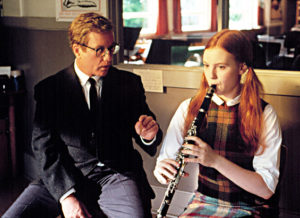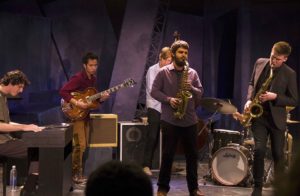Music has been called the ‘”universal language” because of its ability to communicate with people from different places, cultures, and times. There are many styles of music in the world, and some of those styles are very different from each other. Classical music is different from jazz music. Both utilize certain musical forms. Within the classical music genre there are concertos, symphonies, operas, chamber music, etc. Classical composers generally use a disciplined approach and compose according to a specific set of rules. Jazz music, by contrast, consists of ballads, standards, blues, bossa novas, etc.. Its composers operate with very few rules. Musicians also perform the two styles of music differently. Classical musicians play “all the notes on the page”, i.e., exactly the way the composer wrote it. Jazz musicians, on the other hand, start with a general melody, form, or song structure and then focus on improvisation.

Spiritual Lessons from Improvisation
We can learn some great spiritual lessons as believers from the concept of improvisation, which is defined as “an act of improvising”. The word ‘improvise’ means “to compose and perform or deliver without previous preparation; extemporize. To compose, play, recite, or sing (verse, music, etc.) on the spur of the moment.” The word derives from two Latin words: im- + provisus ptp. of providere “to see beforehand, prepare, provide for (a future circumstance).”
The irony of this definition, as it relates to music, is that masters of jazz improvisation perform the way they do not because they didn’t prepare, but because they did. They will spend hours upon hours “in the woodshed”, working on their craft so that when the time comes to “play live”, they’re ready.
A well-known jazz instructor said, “The jazz musician is an instant composer! The melodies which come from their instruments are conceived in their mind just before they play them. The difference between the improviser and the traditional composer is this: the “jazzer” has no eraser to instantly correct mistakes. They practice long and hard trying to make their physical body and their mental frame of mind an appropriate vehicle to execute the ideas formulated in their mind.”
Classical musicians practice long and hard in order to play the music on the written page. Jazz musicians put in the same effort in order to improvise. This basically comes down to the difference between what psychologists call ‘left brain’ or ‘right brain’. The left side of the brain is the analytical or logical side, while the right side is the intuitive, creative side.
Insight from a Movie
A number of years ago Hollywood released a movie called Mr. Holland’s Opus. In it was an interesting scene between a high school music te acher and one of his students, a young lady who was struggling to learn to play the clarinet. She wanted to quit in frustration. Finally he sat down with her and they had this exchange:
acher and one of his students, a young lady who was struggling to learn to play the clarinet. She wanted to quit in frustration. Finally he sat down with her and they had this exchange:
Mr. Holland: “You know what we’ve been doing wrong, Miss Lang? We’ve been playing the notes on the page.”
Student: “But what else is there to play?”
Mr. Holland: “There’s a lot more to music than notes on a page…. It’s about heart, it’s about feelings, and moving people, and something beautiful, and being alive,… and it’s not about notes on a page.”
What does any of this have to do with us as believers? Everything. Too often we can become so locked into the ‘notes on the page’ in the Bible that those words no longer have any life in them for us – therefore, they don’t produce life in us and we are ineffective in impacting other lives for the Kingdom. We lose sight of the most important thing – the relationship with the Master Composer!
Let the Spirit Speak
Mrk. 13:11 “When they lead you away and deliver you up, don’t be anxious beforehand, or premeditate what you will say, but say whatever will be given you in that hour. For it is not you who speak, but the Holy Spirit.”
Yahshua was speaking about specific circumstances here, but we can apply the concept more generally in our everyday lives. We need to be so familiar with the written Word and so in-tune with the Spirit that we don’t have to worry or premeditate what we’re going to do or say in a particular situation – we’re able to simply “go with the flow” because we are ready. “If we live by the Spirit, let us also walk by the Spirit” (Gal. 5:25).
2 Chr. 3:17 “Now Yahweh is Spirit and where the Spirit of Yahweh is, there is liberty”
Jazz musicians, because they haven’t ‘premeditated’ every note that they’re going to play, are free to make a mistake at any time. They have the liberty to do that. Similarly, we as believers, when we’re led by the Spirit, can sometimes miss the mark and make a mistake. We don’t do it deliberately, but when it does happen, we can have the assurance that “there is no condemnation to those who are in Messiah…” (Rom. 8:1).
Corporate Improvisation
Many modern churches are like dogmatic classical musicians; when they gather together, everything has to be “note for note”, exactly as it’s written on the page (i.e., according to their tradition, their way of doing things, or what they’re used to). There can be no variation, there can be no liberties taken. That mindset has got to change, because Yahweh wants us to be led by His Spirit, including in our corporate gatherings. But in order for that change to happen and for it to work the way He intends, each of us individually must spend that practice time in the ‘woodshed’ – praying, meditating on the word, praising and worshiping Him on our own, etc. We’ve got to have that time in our own lives on a regular and consistent basis.
“Spiritual improvisation” is allowing Yahweh, by His Spirit, to lead, guide, and direct our steps, our words, and even our thought processes (how we think) – both alone and together.
One River, Many Streams
Psa. 46:4 “There is a river, the streams of which make glad the city of God, the holy place of the tents of the Most High”
There is only one Spirit of Yahweh (one river), but there can be multiple “streams” and “tributaries” proceeding from it. Different congregations and groups might be parts of different streams at different times. The question is, is that “stream” making glad the city of Yahweh?
There are also different streams of the Spirit within the local assembly. Many things affect how we flow together: our preconceptions, past experiences, religious traditions, current circumstances. We’ve got to learn to leave all of that stuff behind so that we can enter in and freely worship our heavenly Father.
Isa. 35:1-2, 5-7a The wilderness and the dry land shall be glad; and the desert shall rejoice, and blossom as the rose. 2 It shall blossom abundantly, and rejoice even with joy and singing; the glory of Lebanon shall be given to it, the excellency of Carmel and Sharon: they shall see the glory of Yahweh, the excellency of our God… 5 Then the eyes of the blind shall be opened, and the ears of the deaf shall be unstopped. 6 Then shall the lame man leap as a hart, and the tongue of the mute shall sing; for in the wilderness shall waters break out, and streams in the desert. 7 The glowing sand shall become a pool, and the thirsty ground springs of water.
This prophecy has a specific fulfillment, but it should also have a profound meaning to us as believers today. We have all experienced dry ground and desert conditions in our lives. The good news is that the glowing sand will become a pool when the water of the Spirit breaks out within us!
Practical Spiritual Improvisation
1 Cor. 14:26 What is it then, brothers? When you come together, each one of you has a psalm, has a teaching, has a revelation, has another language, has an interpretation. Let all things be done to build each other up.
This is, in effect, speaking of “spiritual improvisation” in the local assembly. Top jazz musicians practice diligently on their own. Then, when they come together to play with others, they are able to flow seamlessly together. So it should be in the local assembly. We develop and hone our spiritual gifts on our own and in little “combos”. Consequently, when the local assembly comes together, everybody has something to offer and it all flows together by the Spirit.

When jazz musicians improvise, most people think it’s ‘magic’ or something reserved only for those who are tremendously gifted. Even highly skilled classical musicians tend to struggle initially when they first attempt to improvise. However, within the jazz community there is the belief that “anyone can improvise”. Anyone, with the proper encouragement and instruction, can learn how to improvise and become good at it with enough practice.
To many within the Body of Messiah, this concept of “spiritual improvisation” carries the same mystique. People believe that one must be tremendously gifted. But the apostle Paul said that “you can all prophesy” (1 Cor. 14:31). Any believer, with the proper encouragement and instruction, can learn how to ‘improvise’ spiritually, to flow in the Spirit.
Get in the Flow
Yahshua repeatedly said “whoever has ears to hear, let him hear”. In the book of Revelations it states numerous times to “hear what the Spirit is saying to the ekklesia”. One of the most crucial skills that we as believers must master is the ability to hear His voice, regardless of what is going on around us or what other people are saying. It is a part of our spiritual inheritance to hear and be led by the Spirit . It was and is the Father’s desire for us. But we must still appropriate it by faith and make the decision to live that way on a daily basis. For spiritual improvisation to become reality, we must get in the flow!


 It all comes down to perspective: why should we glory in those things the Father has freely imparted to us? Instead let us glorify Him who gave us these things; if we’re going to glory, let’s glory in this – that we truly know Him. Knowing Yahweh is intrinsically related to Him exercising lovingkindness, justice, and righteousness in the earth (Jer. 9:24) – for it is through us that He exercises or demonstrates these things to the world! And that’s something worth glorying in!
It all comes down to perspective: why should we glory in those things the Father has freely imparted to us? Instead let us glorify Him who gave us these things; if we’re going to glory, let’s glory in this – that we truly know Him. Knowing Yahweh is intrinsically related to Him exercising lovingkindness, justice, and righteousness in the earth (Jer. 9:24) – for it is through us that He exercises or demonstrates these things to the world! And that’s something worth glorying in! That won’t just “happen.” It’s going to require effort, perseverance, dedication, and commitment to scale that mountain. It’s going to require teamwork. And it won’t be like walking on a smooth, flat, paved road – it will be rough terrain that we’ll be ascending, through thorns and thistles and hot, dry air. We’ll sweat. We’ll get some bumps and bruises. And we’ll probably experience fatigue – in fact, we may experience an almost overwhelming urge to quit. But if we wait upon Yahweh, we will renew our strength. If we wait upon Yahweh, we will mount up with wings as eagles. If we wait upon Yahweh, we will run and not be weary, and we will walk and not faint (Isa. 40:31).
That won’t just “happen.” It’s going to require effort, perseverance, dedication, and commitment to scale that mountain. It’s going to require teamwork. And it won’t be like walking on a smooth, flat, paved road – it will be rough terrain that we’ll be ascending, through thorns and thistles and hot, dry air. We’ll sweat. We’ll get some bumps and bruises. And we’ll probably experience fatigue – in fact, we may experience an almost overwhelming urge to quit. But if we wait upon Yahweh, we will renew our strength. If we wait upon Yahweh, we will mount up with wings as eagles. If we wait upon Yahweh, we will run and not be weary, and we will walk and not faint (Isa. 40:31). And as we ascend, we’ll begin to see things from His perspective. We’ll begin to get glimpses of the view from the top, to see the big picture, the broader panorama. We won’t worry about what we might have left behind in Egypt, and the trials and tribulations of life in the camp will begin to seem small and petty, insignificant. The noise of “war in the camp” will fade and we’ll be able to discern clearly our Father’s voice. We’ll take off our shoes and stand in His presence, beholding His awesome esteem.
And as we ascend, we’ll begin to see things from His perspective. We’ll begin to get glimpses of the view from the top, to see the big picture, the broader panorama. We won’t worry about what we might have left behind in Egypt, and the trials and tribulations of life in the camp will begin to seem small and petty, insignificant. The noise of “war in the camp” will fade and we’ll be able to discern clearly our Father’s voice. We’ll take off our shoes and stand in His presence, beholding His awesome esteem. The same is true of the local ekklesia or assembly: the bricks (individual believers) must be positioned – gathered together in their assigned place; then they must be aligned (they must align their hearts with the purpose of the ministry and take their individual places in the overall structure); finally, they must be joined, mortared together by the Spirit with those around them. Unless all three steps are completed, the structure is incomplete, unstable, & susceptible to the winds of adversity.
The same is true of the local ekklesia or assembly: the bricks (individual believers) must be positioned – gathered together in their assigned place; then they must be aligned (they must align their hearts with the purpose of the ministry and take their individual places in the overall structure); finally, they must be joined, mortared together by the Spirit with those around them. Unless all three steps are completed, the structure is incomplete, unstable, & susceptible to the winds of adversity. Any competent builder uses blueprints if he wants what he’s building to last. Yahweh – the ultimate Builder – was the one who originated this concept. When He instructed Moses to build the tabernacle in the wilderness, He told him, “See that you make it according to the pattern.” (Exod. 25:40). Solomon, likewise, received a pattern for the Temple, a pattern, incidentally, that David had “by the Spirit” (see 1 Chron. 28:11-12). Yet for too long the ‘church’ – the Body of Messiah – has been building according to a different pattern than the one given in the New Testament. Is it any wonder that what’s been created is imperfect, flawed, and relatively ineffective?
Any competent builder uses blueprints if he wants what he’s building to last. Yahweh – the ultimate Builder – was the one who originated this concept. When He instructed Moses to build the tabernacle in the wilderness, He told him, “See that you make it according to the pattern.” (Exod. 25:40). Solomon, likewise, received a pattern for the Temple, a pattern, incidentally, that David had “by the Spirit” (see 1 Chron. 28:11-12). Yet for too long the ‘church’ – the Body of Messiah – has been building according to a different pattern than the one given in the New Testament. Is it any wonder that what’s been created is imperfect, flawed, and relatively ineffective? Eph 4:11-14 He gave some to be apostles; and some, prophets; and some, evangelists; and some, pastors and teachers; (12) for the perfecting of the saints, to the works of service, to the building up of the body of Messiah; (13) until we all attain to the unity of the faith, and of the knowledge of the Son of Elohim (‘God’), to a full grown man, to the measure of the stature of the fullness of Messiah; (14) that we may no longer be children, tossed back and forth and carried about with every wind of doctrine, by the trickery of men, in craftiness, after the wiles of error;
Eph 4:11-14 He gave some to be apostles; and some, prophets; and some, evangelists; and some, pastors and teachers; (12) for the perfecting of the saints, to the works of service, to the building up of the body of Messiah; (13) until we all attain to the unity of the faith, and of the knowledge of the Son of Elohim (‘God’), to a full grown man, to the measure of the stature of the fullness of Messiah; (14) that we may no longer be children, tossed back and forth and carried about with every wind of doctrine, by the trickery of men, in craftiness, after the wiles of error;

 Proverbs 17:17 says “A friend loves at all times, and a brother is born for adversity.” A true friend is one who “sticks closer than a brother” (Pro. 18:24) – even in the face of adversity.
Proverbs 17:17 says “A friend loves at all times, and a brother is born for adversity.” A true friend is one who “sticks closer than a brother” (Pro. 18:24) – even in the face of adversity.
 Each of us has a ministry in the world in which we live – in our daily lives. But each of us also has a ministry in the House of Prayer, that part of the Body to which Yahweh has joined us. Psa. 127:1a tells us that “Unless Yahweh builds the house, they labor in vain that build it.”
Each of us has a ministry in the world in which we live – in our daily lives. But each of us also has a ministry in the House of Prayer, that part of the Body to which Yahweh has joined us. Psa. 127:1a tells us that “Unless Yahweh builds the house, they labor in vain that build it.”
 Hearing His voice isn’t nearly as difficult or esoteric as we sometimes seem to think; Yahshua stated very clearly that “My sheep hear My voice” (John 10:27). However, to learn to discern that voice does take time and dedication. It’s a lifestyle that must be cultivated. Like anything else, the more time and effort you put in, the greater the results you’ll see.
Hearing His voice isn’t nearly as difficult or esoteric as we sometimes seem to think; Yahshua stated very clearly that “My sheep hear My voice” (John 10:27). However, to learn to discern that voice does take time and dedication. It’s a lifestyle that must be cultivated. Like anything else, the more time and effort you put in, the greater the results you’ll see.
 acher and one of his students, a young lady who was struggling to learn to play the clarinet. She wanted to quit in frustration. Finally he sat down with her and they had this exchange:
acher and one of his students, a young lady who was struggling to learn to play the clarinet. She wanted to quit in frustration. Finally he sat down with her and they had this exchange:

